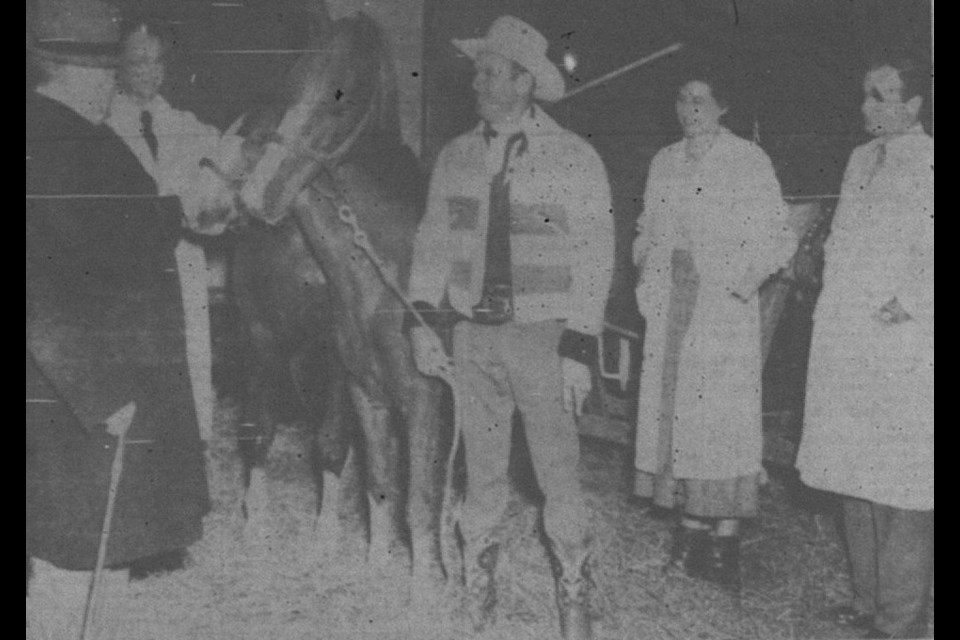In January of 1950 Guelph buzzed with excitement and anticipation. One of the biggest names in the entertainment world was coming to town.
Gene Autry, the singing cowboy who was a star of movie screen, stage and radio was scheduled to do two shows – matinee and evening - at the Memorial Gardens on Jan. 31. With him would be his horse, Champion; his movie sidekick, actor Pat Buttram (who later played Mr. Haney on the TV sitcom Green Acres), and various performers from Autry’s popular Sunday afternoon Melody Ranch radio show.
The previous Christmas, the number one song on North American radio stations was Autry’s recording of Rudolph the Red Nosed Reindeer. Autry’s latest movie, The Last Round-Up, of which he was not only the star but also producer, was playing at the Capitol Theatre.
Autry had visited Canada a few years earlier, doing shows in Montreal and Toronto. His current tour included smaller communities because he said it was in towns like Guelph “where you can get out and meet the audience and make real friends.”
Autry came from a small-town environment. He was born on a ranch in Texas and grew up on a farm outside a little town in Oklahoma. He’d been working as a railroad telegraph operator in a lonely whistle-stop when a stranger who happened to hear him playing his guitar suggested he take it to the nearest radio station and sing a few songs.
That stranger was the "cowboy philosopher” and movie star Will Rogers. Before long, Autry was the King of the Singing Cowboys and a star whose international popularity rivalled that of the biggest names in Hollywood.
Guelph welcomed Gene Autry like visiting royalty. A special reception was held for him at the Royal Hotel where he was greeted by Alderman Douglas Oaks and representatives of the Lions Club, the Board of Trade, radio station CJOY, the Daily Mercury and the managers of the Palace and Capitol movie theatres. Four sets of Guelph twins (all children), winners of a contest, got to meet Autry and the tap-dancing Martel twins who were part of his show, and were given front row seats.
Autry also met nine boys who were captains of the Guelph Schools Safety Patrol. They had a group photograph taken with the star and were given autographed pictures. Every aspect of Autry’s visit received full newspaper coverage.
Guelph merchants didn’t let opportunity slip by. The Shoe House advertised “Smart, colorful Rodeo Boots – the latest word in rubber footwear … for Young Cowboys.” Just $2.95 for a pair! Budd’s Department Store called its mid-winter clearance sale “Guelph’s Greatest Round-Up.” Kelly’s Music Store offered “Your Favorite Gene Autry Recordings” for 79 cents each. Albums were $3.95. The advertisement showed Gene playing his guitar and was decorated with bullet holes.
Memorial Gardens was packed to capacity for both of Autry’s shows. One resident noted that during the matinee performance Guelph’s streets were unusually quiet. There was hardly a kid to be seen. They were almost all at the show. “GENE AUTRY HAD PIED PIPER EFFECT,” the Mercury said.
Gene sang numbers from his new movie and his signature song, Back in the Saddle Again; and of course, Rudolph the Red Nosed Reindeer. It might have been a month past Christmas, but it was still cold – both outside and inside the Gardens. “Boy, it really gets cold up here, doesn’t it?” Autry said.
The audience enjoyed the clowning of Pat Buttram and his partner Frankie Marvin, and the “one-man symphony of barnyard sounds” produced by comedian Rufe Davis. Singer Gloria Gray charmed the crowd with her version of Dear Hearts and Gentle People, and Barbara Bordo amazed them with her rope tricks. Rose Marie Moore, an eleven-year-old acrobat, won the crowd’s hearts. The biggest hit with the kids was the performance of tricks done by Champion and his “understudy” Little Champ, a junior version of the famous horse.
When the last show was over, Autry thanked Guelph for the hospitality that had been extended to him and his fellow performers. Then they were off to the next town.
Soon Guelphites would be able to watch Gene Autry’s Wild West adventures and hear his songs through the rapidly growing new venue of television. Autry would one day make news when he became the owner of the California Angels baseball team, and again when he opened the Gene Autry Museum of the American West in Los Angeles.
Guelph’s Memorial Gardens is long gone. There is no audience today for movies about white-hatted good guy cowboys who are as handy with a guitar as they are with a six-shooter. But most people in Guelph have heard Gene Autry sing. Whenever they’re in a mall or department store during the Christmas season and the traditional songs are playing, his is the voice they hear singing Rudolph the Red Nosed Reindeer.


.png;w=120;h=80;mode=crop)
